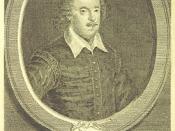By closely analyzing 1 or 2 of Shakespeare's "Procreation Sonnets" (#1 - 17), delineate the nature and complexities of one of the major themes of the Procreation Sonnets.
Death is inevitable. No one can escape death as all succumb to it. Time slowly passes; people age, and eventually die. One is often forgotten after death unless they have left something behind or accomplished great feats. In the Sonnets #1-19 by William Shakespeare, he writes of a beautiful man who should procreate so he will not be forgotten after he passes on. These sonnets depict many themes, of which death, time, and youth will be explored. In Shakespeare's procreation sonnets, death, youth, and time are used as a means to convince the beautiful man to procreate.
As if trying to scare the attractive man, Shakespeare writes "But if thou rememb'red not to be, / Die single and thine image dies with thee," (3, 13-14).
He is telling the man here, that if he fails to produce offspring, his image will die with him; he will leave nothing behind. Shakespeare feels that the man is "[beguiling] the world" (3, 4) by not sharing his "fresh repair" (3, 3). It is a shame for the man not to procreate. He is robbing the world of his beauty. Shakespeare later writes "When I do count the clock that tells the time/ And see the brave day sunk in hideous night, / When I behold the violet past prime/ And sable curls all silvered o'er with white," (12, 1-4). He is referring to the time that has passed and continues to pass. The man's hair will slowly cover with white strands. Shakespeare is stating that the man only has a little time left before it will be to late for him to...



Well Done
I enjoyed reading this essay. Also, it was the first one I have read here that used referencing. Good job.
The quotes were very well integrated, and relevant. I can't really think of any suggestions as there weren't any huge mistakes. The one tiny thing is tense, two verbs were awkward, but other than that, it was excellent.
Keep up the good work :)
1 out of 1 people found this comment useful.